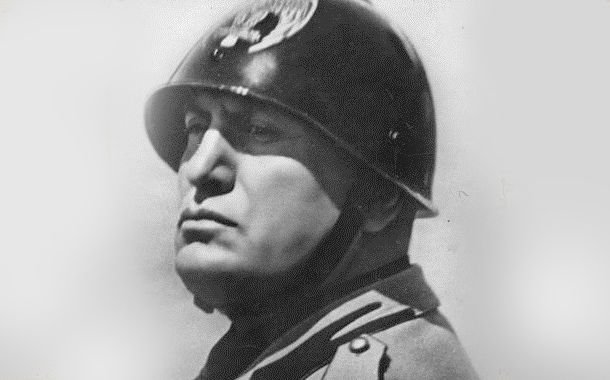<![CDATA[On the 23rd September 1943, Benito Mussolini returned to Italy and created the Italian Social Republic. The republic was meant to symbolise the return of Il Duce to control in Italy, but in reality heralded Italy's new position as nothing more than a Nazi puppet state. Although Rome was declared the capital of the new regime, the city was in Allied hands. Mussolini set up government in the small Italian town of Salo, close to Lake Garda, hence its colloquial name, the Salo Republic. In July 1943 Mussolini was removed from power following a vote of 'no confidence' in the Italian Grand Council. The humiliating defeat that Italy was suffering at the hands of the Allies meant he had lost much of the popular support that had swept him to power. General Pietro Badoglio, who had taken over power from Mussolini, imprisoned the former leader in an isolated hotel in the Apennine Mountains. Conscious that there might be an attempt to free the former leader, Badoglio had an entire police army stationed at the hotel. Despite these precautions, a team of German commandos broke Mussolini out and transported him to Hitler's headquarters. German leaders viewed Mussolini as a liability, even though he was returned to rule from a German held area of Italy, his power was superficial - a face for what was in reality Nazi control of the Italian government. Mussolini issued the 'Verona Manifesto', an outline for a revised version of fascism that had learned from the mistakes of its first incarnation. Among the proposed changes were the return of elections and a free press in Italy. In reality these changes were never initiated, and the country became a dysfunctional police state that relied on Nazi support to prop it up. Mussolini was largely confined to the role of a propaganda machine - celebrating the Nazi party and chastising the Allied forces. He still took advantage of Hitler's support to seek revenge on those who he believed had wronged him. Former members of the Grand Council were executed for their role in his fall from power, including Mussolini's own son in law, Count Ciano. The de facto German occupation led to the darkest part of the war for Italians. Mussolini had essentially allowed himself to become the public representation of brutal Nazi suppression. The Salo Republic tried to induct men between the ages of eighteen and twenty into its army to fight the Allies, a call which only 40% of young men responded to. With the support of local fascist forces, German troops started to round up Italy's Jewish population for deportation to concentration camps in Poland and Germany. In total 9,000 Jews were deported from Italy during the German occupation, with only 980 returning after the end of the war. The biggest single round of deportations occurred in Rome in October 1943, when around a thousand Jews were taken from the city's ghetto. German occupation also led to brutal reprisals against partisan activity. As the German army was forced to retreat into Northern Italy, a series of massacres of civilians took place. A partisan bomb in 1944 killed thirty three members of the occupying army. The Nazi response was to shoot three hundred and thirty five people in the Fosse Ardeatine Caves. Random massacres by the German forces continued as their retreat became more desperate. The most horrific occurred at Marzabotto in Tuscany and Emilia, where German troops annihilated the entire village with a population of 1,800 people. Ultimately, Mussolini was shot by Communist partisans in 1945, as he tried to flee Italy to Switzerland. His return to Italy in 1943 was more than just the final desperate attempt of a deposed leader to return to power. The Salo Republic delivered Italy into German occupation, symbolising the darkest days of World War Two for the Italian people. ]]>
Mussolini's Return to Italy
